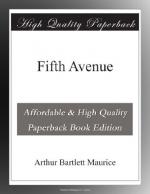But, if merely for the sake of learning a certain point of view, it is amusing to turn over those old volumes dealing with the sunshine and shadow of the city of the sixties. High Life and Moneyocracy, we are told, were synonymous. To use the Tennysonian line, “Every door was barred with gold, and opened but to golden keys.” “If you wish parties, soirees, balls, that are elegant, attractive, and genteel (how they loved those dreadful adjectives ‘elegant’ and ’genteel’!) you will not find them among the snobbish clique, who, with nothing but money, attempt to rule New York.” The words are of the clerical visitor before quoted. “Talent, taste, and refinement do not dwell with these. But high life has no passport except money. If a man has this, though destitute of character and brains, he is made welcome. One may come from Botany Bay or St. James; with a ticket-of-leave from a penal colony or St. Cloud; if he has diamond rings and a coach, all places will be open to him. The leaders of upper New York were, a few years ago, porters, stable boys, coal-heavers, pickers of rags, scrubbers of floors, and laundry women. Coarse, rude, uncivil, and immoral many of them still are. Lovers of pleasure and men of fashion bow and cringe to such, and approach hat in hand. One of our new-fledged millionaires gave a ball in his stable. The invited came with tokens of delight. The host, a few years ago, was a ticket-taker at one of our ferries, and would have thankfully blacked the boots or done any menial service for the people who clamour for the honour of his hand. At the gate of Central Park, every day splendid coaches may be seen, in which sit large, fat, coarse women, who carry with them the marks of the wash-tub.” That was the kind of hot shot that the rural districts wanted from those they sent to look into the iniquities of the Metropolis. At once it made them sit up and filled them with a sense of their own sanctity.
According to the same ingenuous chronicler, the most famous figure in the social life of the New York of the sixties, the later Petronius, or the forerunner of Mr. Ward McAllister, was Brown, the sexton of Grace Church, which, for many years, had been the fashionable centre. “Arrogant old Isaac Brown,” Mrs. Burton Harrison called him in her “Recollections, Grave and Gay,” “the portly sexton who transmitted invitations for the elect, protested to one of his patronesses that he really could not undertake to ‘run society’ beyond Fiftieth Street. To be married or buried within Grace Church’s walls was considered the height of felicity. It was Brown who passed on worthiness in life or death. He arranged the parties, engineered the bridals, conducted the funerals. The Lenten season is a horribly dull season, but we manage to make our funerals as entertaining as possible”—Brown said, according to the quoted story. Without Brown no Fifth Avenue function was complete. “A fashionable lady, about to have a fashionable gathering




